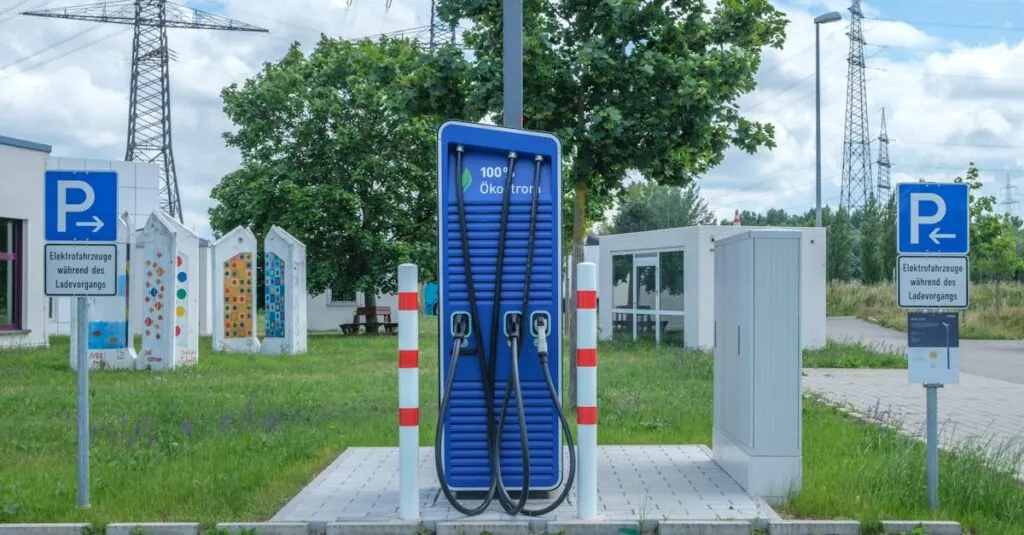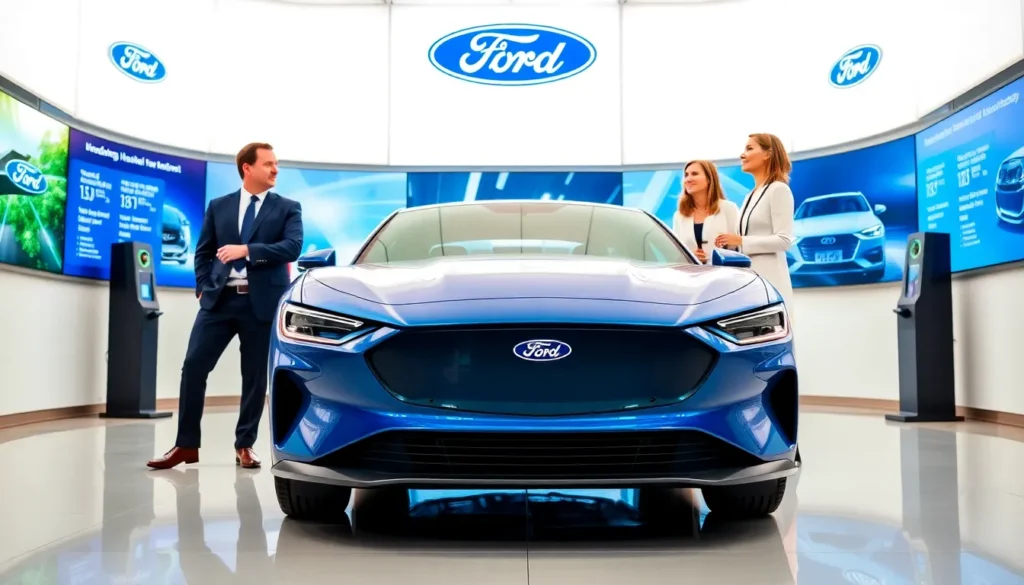Table of Contents
ToggleImagine driving a car that doesn’t just take you places but also gives Mother Earth a high-five along the way. Electric vehicles (EVs) are changing the game, turning the roads into eco-friendly highways. With zero tailpipe emissions, these sleek machines are like the superheroes of the automotive world, battling pollution and climate change one charge at a time.
As the world races towards a greener future, EVs are leading the charge (pun intended). They’re not just a trendy choice for hipsters in plaid shirts; they’re a smart investment for anyone who cares about clean air and a sustainable planet. Buckle up as we explore how electric vehicles are revving up environmental benefits, making our planet a better place for generations to come.
Overview Of Electric Vehicles
Electric vehicles (EVs) rely on one or more electric motors powered by rechargeable batteries. These vehicles offer a cleaner alternative to traditional internal combustion engines. Battery technology continues to advance, improving range and reducing costs for consumers.
Charging infrastructure has also expanded significantly, allowing more convenience for EV owners. Numerous public charging stations exist in urban and suburban areas, promoting wider adoption of electric vehicular technology.
Manufacturers produce various types of EVs, including fully electric, plug-in hybrids, and hybrid electric vehicles. Fully electric vehicles operate solely on electric power, generating zero tailpipe emissions and minimizing air pollution. Plug-in hybrids combine an electric motor with a conventional engine, providing flexibility and efficiency for drivers.
Numerous environmental benefits arise from widespread EV adoption. The reduction of greenhouse gas emissions plays a crucial role in addressing climate change. Transitioning from fossil fuel-powered vehicles to electric models can significantly enhance local air quality, leading to fewer health issues related to air pollution.
Advancements in renewable energy sources bolster the sustainability of electric vehicles. When powered by wind, solar, or hydropower, EVs contribute even less to overall emissions. The combination of electric vehicles and clean energy sources lays the groundwork for a more sustainable transportation future.
Societal influence plays a significant role in the transition toward electric mobility. As consumer awareness about climate change grows, more individuals prefer vehicles that align with their values. Electric vehicles not only represent a step toward personal responsibility but also encourage sustainable innovations in transportation.
Environmental Benefits Of Electric Vehicles
Electric vehicles (EVs) offer significant environmental advantages, particularly in terms of emissions and air quality. Their adoption contributes to a greener planet.
Reduction Of Greenhouse Gas Emissions
Electric vehicles play a vital role in lowering greenhouse gas emissions. According to the U.S. Environmental Protection Agency, EVs produce an estimated 60% fewer emissions than conventional gasoline-powered cars. Increased reliance on renewable energy sources for electricity further reduces emissions associated with EV charging. Transitioning to electric vehicles supports international climate goals, aligning perfectly with efforts to combat global warming. Data shows the transportation sector accounts for nearly 29% of total greenhouse gas emissions in the U.S., highlighting the necessity of EV adoption.
Decreased Air Pollution
Decreasing air pollution represents another key benefit of electric vehicles. Unlike traditional vehicles, EVs produce zero tailpipe emissions, which significantly improves urban air quality. A study conducted by the Union of Concerned Scientists indicates that widespread EV usage can cut smog-forming pollutants, leading to healthier communities. Reduction of particulate matter and nitrogen oxides enhances public health, especially in densely populated areas. With electric vehicles, cities can combat respiratory issues and other health problems linked to poor air quality more effectively.
Energy Efficiency And Renewable Energy
Electric vehicles significantly enhance energy efficiency while promoting the use of renewable energy sources.
Utilizing Renewable Energy Sources
Electric vehicles benefit from the growing reliance on renewable energy. Solar, wind, and hydroelectric power provide cleaner electricity to charge EVs, reducing the carbon footprint associated with their operation. As more charging stations utilize this sustainable electricity, the environmental benefits multiply. Studies show that charging an EV with renewable energy can reduce greenhouse gas emissions by up to 70%. Transitioning to these energy sources can also lessen dependence on fossil fuels, supporting efforts to mitigate climate change.
Energy Consumption Compared To Gasoline Vehicles
Comparative energy consumption shows electric vehicles operate more efficiently than gasoline vehicles. EVs convert over 60% of electrical energy from the grid to power at the wheels, while conventional gasoline vehicles convert only about 20% of fuel energy into movement. This stark difference translates into significant energy savings. Additionally, as the electricity grid becomes greener, the emissions associated with charging EVs drop, making them increasingly advantageous for the environment. Ultimately, this efficiency underscores the pivotal role electric vehicles play in reducing overall energy consumption.
Economic Impacts On The Environment
Electric vehicles (EVs) provide substantial economic benefits, influencing both personal finances and industry trends positively.
Lower Fuel Costs
Lower fuel costs stem from the efficiency of electric vehicles. Charging an EV typically costs less than gasoline, which allows owners to save money over time. Depending on local electricity rates, EV drivers can enjoy up to a 60% reduction in fuel expenses compared to traditional vehicles. This cost advantage becomes even more pronounced as charging infrastructure expands and electricity prices stabilize. Additionally, the increasing availability of renewable energy sources contributes to lower charging costs, further enhancing EV affordability in the long run.
Job Creation In The Green Sector
Job creation in the green sector receives a boost from the adoption of electric vehicles. As demand for EVs rises, manufacturers require more skilled workers for assembly and production. Reports indicate that the EV industry could create over 1.5 million jobs in the U.S. by 2030, emphasizing the economic potential of green technology. Moreover, investment in charging infrastructure generates additional employment opportunities in construction and maintenance sectors. This trend not only strengthens the job market but also promotes sustainable practices across industries, demonstrating the positive ripple effects of transitioning to electric mobility.
Electric vehicles represent a vital shift towards a more sustainable future. By significantly reducing greenhouse gas emissions and enhancing air quality, they contribute to healthier urban environments. The transition to electric mobility not only supports climate goals but also aligns with growing consumer preferences for eco-friendly options.
As advancements in battery technology and charging infrastructure continue to evolve, the benefits of EVs will only expand. This movement toward electric vehicles is not just about cleaner transportation; it’s about creating a lasting impact on public health and the economy. Embracing electric vehicles today paves the way for a greener planet tomorrow.




